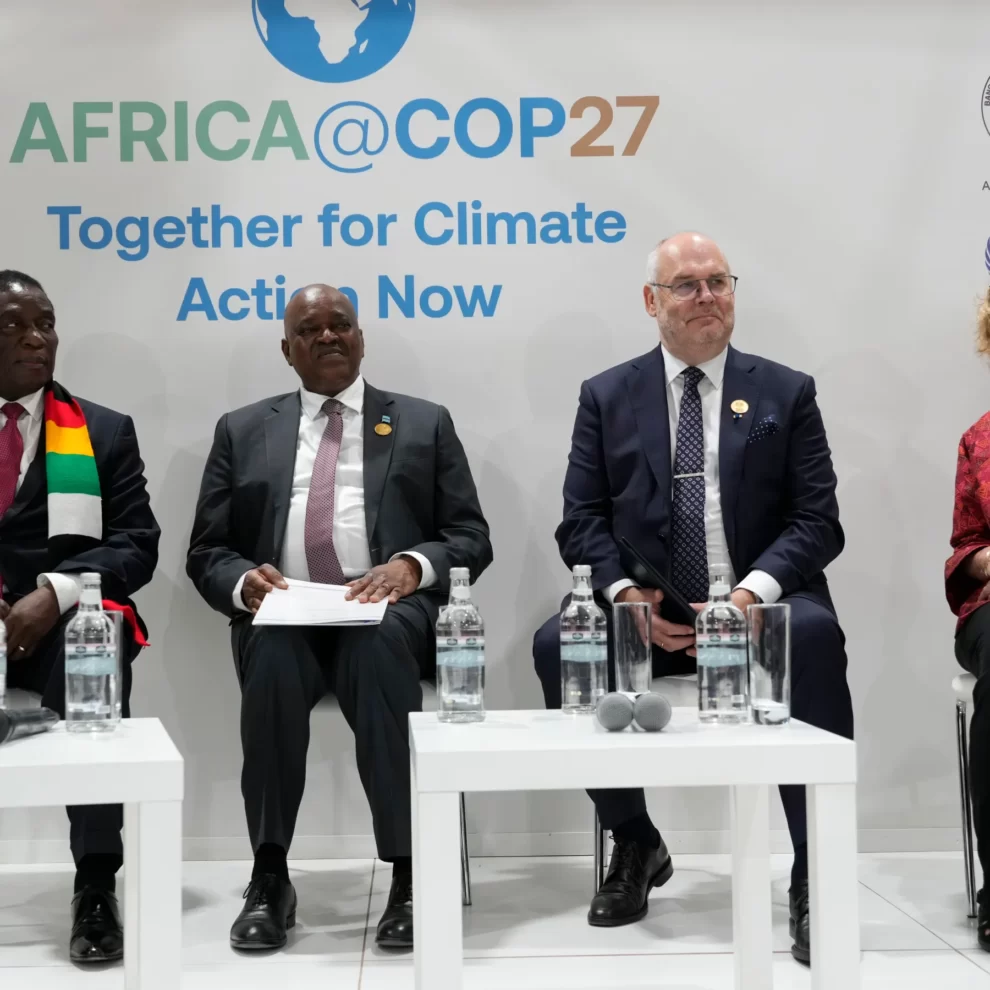As the 28th edition of the Conference of the Parties (COP), the world’s foremost climate summit, begins in the United Arab Emirates on November 30, Africa is grappling with some of the deadliest impacts of a heating planet.
The Horn of Africa, which suffered a drought earlier this year, is now battling floods. From Somalia to Kenya, extreme weather is forcing mass displacement.
Earlier this year, Cyclone Freddy, the longest-running tropical storm, hit Southern Africa, killing at least 1,000 people.
Amid these crises, the African Group of Negotiators (AGN), which is currently chaired by Zambia, will speak for the continent at the COP28 talks in Dubai. Although Africa is responsible for less than 5 percent of global emissions, it is disproportionately affected by negative climate change impacts. So, for African countries, fighting climate effects is urgent — and a matter of survival.
What’s Africa pushing for in Dubai?
Some of the biggest issues that the AGN will focus on, according to chief negotiator Ephraim Shitima, are a just energy transition and climate change finance, including funding for adaptation.
Most countries by now agree that a pivot or transition away from fossil fuel production or consumption to renewables is inevitable, but a key issue African leaders are pushing is the continent’s right to a just transition.
African countries, many of them low and middle-income developing economies, are negotiating for opportunities to accelerate their fossil fuel production to enable them to industrialise, before reinvesting those gains in green energy sources. The argument is that since developed countries became so by burning fossils to build factories and create generational wealth, African countries too, must be given the chance to accelerate their own development and provide energy to the millions lacking it on the continent, using these same fuels, particularly gas, which is seen as less polluting by some. At the moment, more than 600 million Africans do not have electricity and about 900 million cannot access clean cooking methods.
There has been strong pushback on this position from the European Union but also African climate experts and activists. Some say all fossil production should be abandoned as there is no evidence that oil and gas-rich nations like Nigeria have reinvested oil wealth in renewables or even in development. A “dash for gas” will leave the continent stranded with assets that no one wants while renewable sources like wind and solar will help “leapfrog” development, others argue.
“Both sides of the argument are actually right,” former African Union (AU) climate adviser Faten Aggad said. “Africa is vulnerable when oil prices crash, and that confirms what the activists are saying and whether we like it or not industry and trade are moving to renewables with major economies launching trade measures that threaten African countries,” she said.
Aggad was referring to the EU’s Carbon Border Adjustment Mechanism which will see importers of goods taxed based on the amount of CO2 emitted during their production. On the other hand, “we are between a rock and a hard place”, Aggad said. “We are being sold this dream of renewables but we barely have any investments in it. Gas is the only option available to Africa.”
Despite the controversies, the AGN at COP28 will propose that developed countries stop investing in fossil fuel projects by 2030 and let developing nations fill that gap.
Funds, funds, funds
The issue of climate financing is set to come up once again. African countries have been demanding that rich countries support them with funds to build infrastructure and put in place measures that will help them adapt to a changing climate and a warmer world – infrastructure like sea walls for those countries facing significant sea level rise problems, for example.
Those demands are in line with a UNFCCC principle enshrined in several agreements and resolutions called Common But Differentiated Responsibilities (CBDR), which acknowledges that while every country must be responsible for contributing to driving down temperatures, some countries are historically more responsible than others, and should take a lead in solutions.
So far, the adaptation funds flowing to Africa have been a trickle. Rich countries promised $100bn in annual climate financing for developing nations back in 2009, and renewed that pledge at COP26 in Glasgow; but as of 2020, only $83bn was being raised annually. One report notes that most of that money has been made available through loans and targeted countries outside Africa. Meanwhile, the continent needs more than $500bn for climate change adaptation costs through 2030, of which about $11bn was available in 2020.
Fighting for climate justice
African negotiators have had success in recent summits. Intense lobbying – alongside countries from other regions – for more than three decades finally led to the creation of a fund for loss and damage at last year’s conference in Egypt.
For years, developed nations blocked the creation of the fund, which is meant to see low-emitting developing nations not historically responsible for global warming, get paid for the irreplaceable loss of lives, culture, and infrastructure by climate change, whether in Africa, Asia or elsewhere. Many see the enshrining of the fund in the final joint agreement as a big win for the fight for climate justice.
The funds have not materialised yet, and it is still unclear where the money will come from precisely, as well as whether the largest emitters, like Russia and China, which are still under the “developing” nations category will also be required to contribute to the fund. A loss and damage transition committee is expected to present a suggested framework that will outline who contributes and who benefits from the fund in Dubai.
What’s at stake?
COP talks have mostly focused on talk rather than action, especially from rich countries expected to provide climate financing and drastically cut their carbon emissions. Unfortunately, Aggad, the former AU adviser, said, African negotiators are usually unable to counter their richer counterparts. At the talks, lobbyists from developed countries often far outnumbered those from Africa or Asia.
“The AGN focuses too much on COP when for developed countries, it’s more of a foreign diplomacy business with multiple ministries working on getting concessions on deals that AGN is not even aware of so by the time they get to COP, a lot has been sorted,” she said. “Africa needs to rethink how to negotiate. COP is just a moment [but] you need to tell your story in a continuous manner in the global space.”
There is a lot at stake for African countries should COP negotiations this time fail to take the continent into account at a final sign-off. Already, Africa is warming faster than the rest of the world, according to an Intergovernmental Panel on Climate Change (IPCC) report, and sea levels here are rising faster than the global average. Besides, climate change progress for Africa is tightly wound with the continent’s development agenda.
It is why African negotiators and leaders say they are more prepared to push for the funding and the leverage they need at COP28. Signalling their readiness, African heads of states planned ahead at the first African Climate Summit in Nairobi in August. In the resulting Nairobi Declaration, they urged their richer counterparts to commit to past funding pledges, reform unfavourable tax regimes, reduce borrowing costs for African countries, and restructure their debts.
In addition to pursuing a right to use gas as a transition fuel, African leaders are also keen to position their countries as ones that can be crucial to climate solutions due to the continent’s natural resources and manpower needed to deliver infrastructure for renewables. Although Africa holds 40 percent of the world’s solar energy potential, for example, it has less than 1 percent installed capacity.
Source: AL JAZEERA











